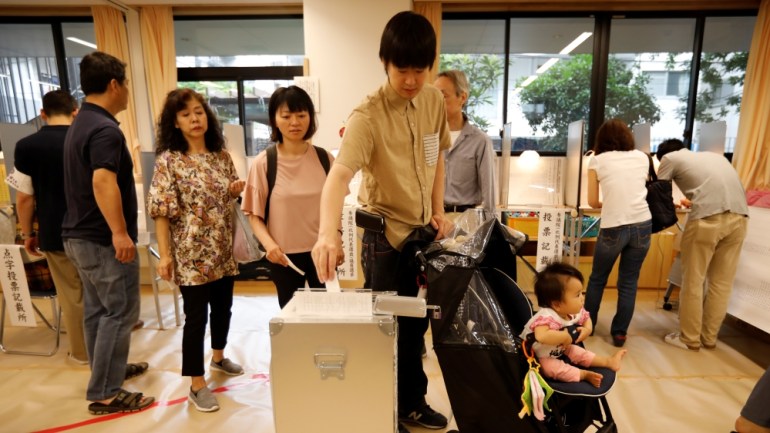Voters in Japan head to the polls on Sunday to elect members of their House of Representatives in an election seen as a test for the country’s new Prime Minister Shigeru Ishiba.
With Ishiba’s governing Liberal Democratic Party (LDP) embroiled in scandals and facing diminishing public support, the vote is expected to present the party with its toughest electoral challenge in more than a decade.
While the result may be seen as a measure of public endorsement of or displeasure with Ishiba, the election is not likely to see his LDP – which has maintained a tight grip on power in Japan since 1955 – fall too far from its pedestal.
Analysts expect the opposition Constitutional Democratic Party of Japan (CDPJ) to gain significant ground, but not enough to change the government. The LDP, they predict, may lose a few dozen seats. But even in a worst-case scenario, the party will still likely be number one in the ruling bloc.
Here’s what you should know about Japan’s election:
Who’s in the race?
The LDP has ruled Japan for almost all of the post-war era and holds a majority in the 465-seat lower house. The LDP’s longtime coalition partner is Komeito, a party backed by a large Buddhist group that has often lent crucial campaign support to its political partner.
Formed in 1955 and credited with leading Japan’s economic recovery after World War II, the LDP’s rule was interrupted twice, in 1993-1994 and 2009-2012. In both times, bribery scandals rocked the party and its public support.
Now the LDP’s popularity has hit a low again.

What do polls say?
A recent poll by Japan’s Asahi newspaper showed the LDP may struggle in the election, potentially losing 50 of the 247 seats it now has in parliament.
The main opposition CDPJ is making inroads, with the Asahi poll estimating it could grab as many as 140 seats in the election, up from its current 98.
If that happens, the new prime minister’s calling of this snap election will have backfired.
Other surveys portend bad news for the LDP too.
According to the Pew Research Centre, just 30 percent of Japanese people surveyed in March had a favourable view of the LDP, with 68 percent holding an unfavourable view. But the opposition did not fare any better in the public’s opinion, with just 29 percent of those surveyed holding a positive view of the CDPJ, according to Pew.
More concerning, only a third of those surveyed by Pew were satisfied with “the way democracy was working” in Japan.
What’s at stake?
Ishiba dissolved parliament and called an election shortly after taking over as prime minister on October 1, when he replaced the LDP’s outgoing and embattled premier Fumio Kishida.
Craig Mark, adjunct professor at Hosei University in Tokyo, said Ishiba called the election a year before one was required under Japan’s constitution in order to catch the opposition “off guard and secure a more solid mandate to pursue his policy agenda”.
“He’s banking on the public rallying behind a new face and image for his party, following the unpopularity of former Prime Minister Fumio Kishida,” Mark wrote in The Conversation magazine.
Kishida’s popularity had plummeted amid a major corruption scandal involving unreported political funds.
The opposition CDPJ, Mark said, is also hoping to increase its vote by projecting “an image of reliability and stability”.
“Ishiba’s challenge in this early election is not only to win enough votes to retain government, but to be electorally successful enough to hold off his rivals from the conservative wing of the LDP,” Mark added.
The Asian Network for Free Elections (ANFREL) has described the election as “crucial” for the LDP and Ishiba, in terms of gauging public trust following recent scandals and mounting economic concerns.
“It will serve as a critical indicator of whether the LDP can regain public trust and retain its dominance or if opposition parties can capitalise on public dissatisfaction,” ANFREL said.
When will voting start?
Polling stations open at 7am Sunday (22:00 GMT Saturday) and voting ends at 8pm (11:00 GMT) on Sunday, with results filtering in later in the night and continuing into the early morning.
Vote counting in Japan’s elections is generally conducted quickly, said Rob Fahey of The Waseda Institute for Advanced Study in Tokyo, and results will likely be announced on Sunday night, with only some seats – those that require recounts or involve other issues – being announced on Monday.

Why the election matters?
If the LDP is unable to retain its poll position in the ruling coalition, questions will be asked of Ishiba’s leadership, raising the spectre of continuing political instability in Japan at a time of economic uncertainty and a challenging foreign relations environment.
Analysts, in particular, point to the health of Japan’s defensive capabilities amid growing regional tension with nearby China, Russia and North Korea.
On the other hand, if the likely reduction in LDP seats “is as small as possible”, Ishiba will strengthen his standing in the party by having delivered a positive election result and will be recognised as the “prime minister who has the public’s support”, said Kazuto Suzuki, associate fellow at the Asia-Pacific Programme of Chatham House.
“If Ishiba can create a secure base of government, Japanese politics will be stabilized and Japan’s foreign and security policies, which were strengthened by the Abe and Kishida administrations, can continue to be bolstered,” Suzuki wrote in an analysis brief earlier this month.
